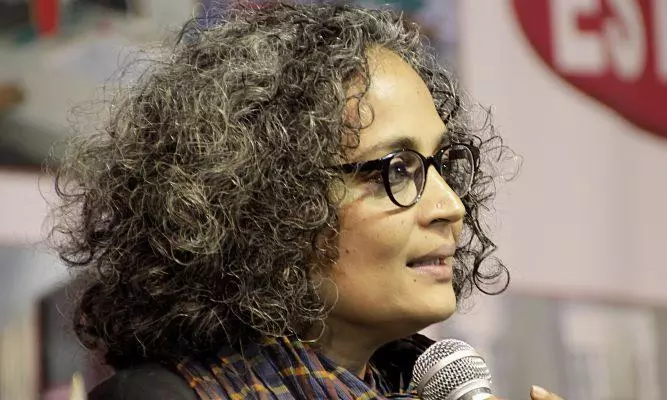
Right to express dissent crucial: Activists write to annul UAPA against Roy
text_fieldsThe sanction to prosecute Booker Prize-winning author Arundhati Roy under the contentious and stringent anti-terrorism Unlawful Activities Prevention Act (UAPA) has been condemned in an open letter signed by over 200 Indian academics, activists, and journalists, urging the Central government to withdraw the decision.
The letter, published this week, condemns the government’s decision and calls for the protection of the fundamental right to freely and fearlessly express views on any subject. The signatories assert that such actions undermine the nation's democratic principles and constitutional rights.
Ajay Dandekar, a history professor and one of the signatories, criticized the decision as unjustified, emphasizing that the Indian constitution upholds Roy’s right to freedom of expression, reported The Guardian.
Support for Roy has also come from various groups, including the Samyukt Kisan Morcha, an umbrella group of farmer unions. They, along with civil rights groups, activists, and students, have staged protests in Delhi and Bengaluru, denouncing the government's actions.
The controversy stems from a decision made last week by the lieutenant governor of Delhi, Vinai Kumar Saxena, who authorized the police to prosecute Roy and academic Sheikh Showkat Hussain under the UAPA. The charges are related to remarks made at a 2010 seminar, where Roy reportedly stated that the disputed region of Kashmir had never been "an integral part of India."
Since winning the Booker Prize in 1997 for her debut novel "The God of Small Things," Roy has been an outspoken critic of various Indian governments, including the current administration led by Narendra Modi.
Her critiques span a range of issues, from capitalism and globalization to the treatment of minorities and human rights. While Roy has garnered both praise and censure for her views, the recent decision to prosecute her under such a harsh law has shocked many.
Mukta Manohar, general secretary of the Pune municipality Safai union and another signatory, questioned the democratic principles at play. Manohar and other signatories believe that upholding the constitutional right to disagree with the government is crucial and that the prosecution appears to be a form of revenge against critics.
Arnab Goswami, a pro-Modi TV anchor, expressed delight at the decision, referring to Roy in derogatory terms and supporting the prosecution.
The timing of the prosecution, given that the complaint against Roy has been pending for 14 years, has raised eyebrows. Supreme Court lawyer Sanjay Hegde noted that prosecuting Roy under less severe laws, such as those dealing with provoking disharmony, would have been barred by the statute of limitations. However, no such limitation applies to the UAPA, which is why it is now being invoked.
Hegde believes the case will face significant challenges in court, including explaining the 14-year delay and the lack of any violence or criminal acts resulting from Roy's words. Human rights lawyer Colin Gonsalves also doubts the prosecution's success, pointing out that there is no evidence linking Roy to any violence or efforts to overthrow the state.
The broader implications of this move are concerning to some. Despite hopes that Modi’s reduced majority in the recent general election might lead to a more tolerant approach to dissent, the opposite seems to be happening. Hegde suggested that targeting Roy sends a clear message to government critics: stay silent or face potential prosecution under severe laws like the UAPA.























